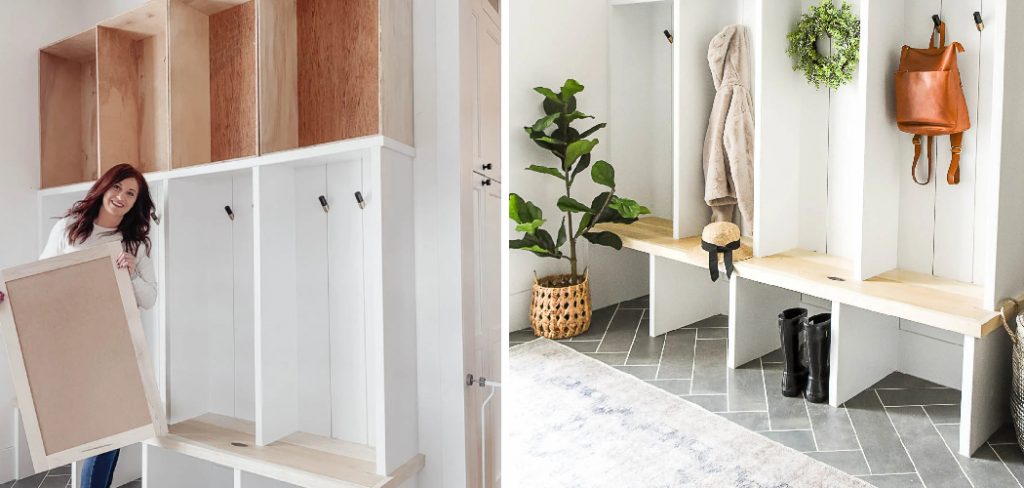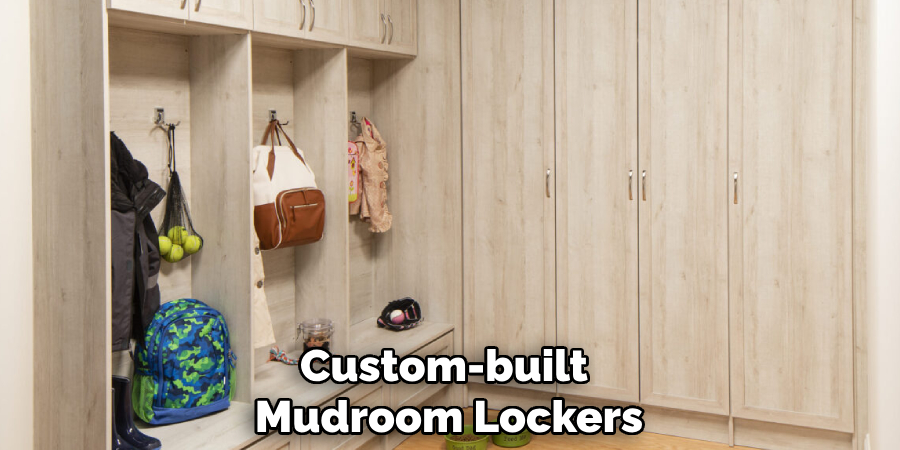Are you tired of walking into a chaotic entryway, with shoes scattered and coats piled haphazardly? A well-organized mudroom can be the solution to your woes. For many households, the mudroom serves as a transition space from the outdoors to the indoors, and having dedicated lockers can make this area both functional and stylish.
In this blog post, we will guide you through the process of how to build mudroom lockers. Whether you’re an experienced DIY enthusiast or a beginner, these detailed steps will help you create a custom storage solution that brings order and elegance to your home. You’ll learn about the benefits of mudroom lockers, the materials you’ll need, and the step-by-step process to build them. By the end of this guide, you’ll have a clear path to transforming your mudroom into a neat and organized space.

Why Mudroom Lockers Make Sense
Ultimate Organization
Mudroom lockers offer a designated spot for each family member to store their belongings. This helps in reducing clutter and maintaining a tidy entryway. Each locker can be personalized to meet individual needs, whether it’s for shoes, backpacks, or sporting equipment.
Space Optimization
By utilizing vertical space, mudroom lockers maximize storage without taking up too much floor space. This is especially beneficial for smaller mudrooms where every inch counts. The added shelves and hooks provide ample storage options, ensuring everything has its place.
Aesthetic Appeal
Custom-built mudroom lockers can enhance the overall aesthetic of your home. With various design options, you can create lockers that complement your interior decor. From rustic wood finishes to sleek modern designs, the possibilities are endless.

Planning Your Mudroom Lockers
Assess Your Needs
Before you start building, consider what items you need to store in your mudroom. Do you need more hanging space for coats? Shelves for shoes? Drawers for smaller items? Make a list of your requirements to guide your design process.
Measure Your Space
Accurate measurements are crucial for a successful project. Measure the height, width, and depth of your mudroom to determine the dimensions of your lockers. Consider leaving some space between each locker for wiggle room and easy access.
Design Inspiration
Browse online for design inspiration to see what styles and features appeal to you. Look for ideas on platforms like Pinterest or home improvement websites. Sketch out your design, incorporating your storage needs and available space.
Materials and Tools for How to Build Mudroom Lockers
Essential Materials
For this project, you’ll need:
- Plywood or MDF boards for the locker frames
- 2×4 lumber for support
- Wood screws and nails
- Wood glue
- Paint or stain
- Hooks and handles
- Sandpaper
Necessary Tools
Ensure you have the following tools on hand:
- Tape measure
- Circular saw or jigsaw
- Drill and drill bits
- Hammer
- Screwdriver
- Paintbrush or roller
- Level
Safety Gear
Safety should always be a priority. Wear safety goggles, gloves, and a dust mask while cutting wood and sanding surfaces. Keep a first-aid kit nearby just in case.

Building the Locker Frames
Cutting the Wood
Start by cutting your plywood or MDF boards to the desired dimensions for the locker sides, top, bottom, and shelves. Use a circular saw for straight cuts and a jigsaw for any curved sections. Double-check your measurements before cutting to avoid mistakes.
Assembling the Frame
Lay out the pieces on a flat surface and begin assembling the frame. Apply wood glue to the edges before securing them with wood screws. Use clamps to hold the pieces together while the glue dries. Ensure the frame is square by checking all corners with a level.
Installing the Shelves
Once the frame is assembled, measure and mark the locations for your shelves. Secure the shelves using wood screws, making sure they are level. If your design includes cubbies or drawers, install dividers and supports as needed.
Adding the Finishing Touches
Sanding and Painting
Smooth all surfaces with sandpaper to remove any rough edges or splinters. Wipe down the wood to remove dust before applying paint or stain. Choose a color that complements your home decor and apply at least two coats for a durable finish.
Attaching Hooks and Handles
Install hooks and handles in your preferred locations. Consider adding hooks for coats and bags, and handles for any drawers. Ensure they are securely fastened and can support the weight of the items they will hold.
Customizing and Personalizing
Personalize your lockers with labels, decorative trim, or fabric liners. This not only adds a unique touch but also helps each family member easily identify their designated space.
Maintaining Your Mudroom Lockers
Regular Cleaning
Keep your lockers clean by regularly wiping down surfaces and removing any dirt or debris. This will help maintain the appearance and longevity of your lockers.
Seasonal Organization
At the start of each season, reassess the items stored in your mudroom. Store away seasonal items that are no longer needed and make room for new ones. This ensures your lockers remain functional year-round.
Inspecting for Wear and Tear
Periodically check for any signs of wear and tear. Tighten loose screws, replace any damaged hooks, and touch up paint as needed. Regular maintenance will keep your lockers looking and functioning their best.
Inspiring Examples of Mudroom Lockers
Rustic Charm
A rustic design with reclaimed wood and vintage hooks can add warmth and character to your mudroom. Pair with woven baskets for additional storage and a cozy feel.

Modern Minimalism
For a sleek and contemporary look, opt for clean lines and neutral colors. Incorporate hidden storage compartments to keep clutter out of sight.
Family-Friendly
Create a fun and functional space with brightly colored lockers and playful accents. Add a chalkboard or whiteboard for notes and reminders, making it easy to stay organized.
Common Mistakes to Avoid
Skipping the Planning Phase
Failing to plan properly can lead to mistakes and frustration. Take the time to design your lockers and gather all necessary materials before starting.
Inaccurate Measurements
Inaccurate measurements can result in poorly fitting pieces. Always double-check your measurements and cut carefully to ensure a precise fit.
Neglecting Safety
Safety is paramount in any DIY project. Wear protective gear and follow safety guidelines to prevent accidents and injuries.
Eco-Friendly Options for Mudroom Lockers
Sustainable Materials
Choose eco-friendly materials such as reclaimed wood or FSC-certified lumber. These options are environmentally responsible and add a unique touch to your design.
Low-VOC Paints
Opt for low-VOC (volatile organic compounds) paints and stains to reduce indoor air pollution. These products are safer for your health and the environment.
Energy-Efficient Lighting
Incorporate energy-efficient LED lighting in your mudroom. This provides ample illumination while reducing your energy consumption.
Budget-Friendly Tips
Repurpose Materials
Save money by repurposing materials you already have. Old furniture pieces or leftover wood can be transformed into functional locker components.
DIY vs. Professional Help
While hiring a professional can ensure a flawless finish, doing it yourself can save on labor costs. Assess your skills and decide which tasks you can handle on your own.
Shop Smart
Look for sales and discounts on materials and tools. Home improvement stores often have clearance sections where you can find great deals.
Safety Precautions for Building Mudroom Lockers
General Safety Guidelines
Before starting your project, ensure your workspace is well-ventilated and free from clutter. Keep children and pets away from the work area to avoid accidents. Always read and follow the manufacturer’s instructions for any tools and materials you use.
Tool Safety
When using power tools, wear appropriate personal protective equipment such as safety goggles, gloves, and ear protection. Make sure to keep your hands clear of moving parts and always unplug tools when changing bits or making adjustments. Familiarize yourself with the safety features of each tool before beginning your project.
Handling Materials
Be cautious when handling heavy or sharp materials. Use proper lifting techniques to avoid strain and injury. When cutting wood, clamp it securely to prevent movement, and always cut away from your body. If you’re using adhesives or paints, follow safety guidelines to avoid inhalation or skin contact.

Emergency Preparedness
Have a first-aid kit readily available and know how to use it. Familiarize yourself with the location of emergency exits in your workspace, and keep a phone nearby in case you need to call for help. Knowing basic first-aid procedures can make a significant difference in case of an accident.
Conclusion
Building your own mudroom lockers is a rewarding project that enhances both the functionality and aesthetic of your home. With careful planning, the right materials, and a bit of elbow grease, you can create a custom storage solution that suits your needs perfectly. Hopefully, this article gave you some helpful tips about how to build mudroom lockers successfully, so now that you have the proper knowledge on how to get the job done, why not give it a try today?
About the Author
Adrian Green, a lifelong woodworking enthusiast, shares his passion for the craft through The Woodenify Blog. With a foundation built on years of hands-on experience in his father’s woodworking shop, Adrian is dedicated to helping others learn and grow in the world of DIY woodworking. His approach to woodworking combines creativity, practicality, and a deep appreciation for the art of building with your own hands. Through his blog, he inspires individuals of all skill levels to embark on their own woodworking journeys, creating beautiful, functional pieces of furniture and décor.
Professional Focus
- Specializes in DIY woodworking projects, from furniture to home décor.
- Provides step-by-step guides and practical tutorials for woodworkers of all skill levels.
- Dedicated to helping readers build confidence and skill through easy-to-follow instructions and tips.
- Passionate about fostering a community of makers who can share, learn, and grow together.
Education History
- University of Craft and Design – Bachelor of Fine Arts (BFA) in Woodworking and Furniture Design
- Woodworking Apprenticeships – Extensive hands-on training with skilled craftsmen to refine carpentry and furniture making techniques.
- Online Courses & Masterclasses – Continued education in advanced woodworking techniques, design principles, and specialized tools
Expertise:
- DIY woodworking, carpentry, furniture making, and home décor projects.
- Creating accessible tutorials and guides for beginner to advanced woodworkers.
- Sharing the joys and satisfaction of woodworking, from raw materials to finished products.
